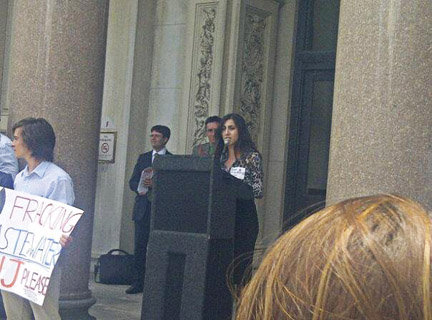The mayor and Town Council banned fracking and fracking waste water in Secaucus at the June 26 council meeting in a resolution that states that the drilling process causes environmental hazards. Hydraulic fracturing or “fracking” is a drilling method that involves pumping sand and chemical-laden water at high pressures to obtain natural gas from shale rock formations.
While fracking is unlikely in Secaucus, the resolution supports a larger movement, calling for a statewide and national ban. It came up the day after the State Senate passed a bi-partisan bill that would prohibit wastewater from hydraulic fracturing from being treated, dumped, or stored in the state. The bill now sits on Gov. Chris Christie’s desk for his consideration.
“I realized how important it was for communities like Secaucus to lead by example.” – Amanda Nesheiwat
____________
New Jersey does not have stores of natural gas like central Pennsylvania, but industrial waste sites in the state have reportedly accepted fracking wastewater.
Setting an example
Secaucus is the first municipality to ban fracking in Hudson County and one of a number of others mostly in central and southern NJ such as Trenton and Red Bank that have passed resolutions against fracking. The effort to ban fracking in Secaucus was initiated by Amanda Nesheiwat, a recent college graduate who serves as the chair of the town’s Environmental Committee and who also successfully pushed for a town-wide ban on Styrofoam.
Nesheiwat spoke at a Trenton rally against fracking in NJ on June 14. Protests have also taken place in Albany and last week protestors shut down a new gas drilling rig in central Pennsylvania.
“I realized how important it was for communities like Secaucus to lead by example,” said Nesheiwat during the council meeting. She had just returned from a conference on sustainable development in Brazil, where she served as a youth delegate for the United Nations. “This is the kind of stuff that is going to save our civilization. It is working together, grassroots organizing, and community building.”
The resolution goes beyond a local ban and states that the municipality will send a letter to the state Assembly and Senate members alerting them to the municipality’s concerns and urging them to ban fracking in New Jersey. A statewide one-year moratorium on fracking is set to expire January 2013.
The resolution also outlines the municipality’s support for the bill under review by Gov. Christie to prohibit the treatment, disposal, or storage of fracking wastewater in New Jersey.
According to the resolution, wastewater, wastewater solids, sludge, drill cuttings, and other byproducts from the fracking process are known to contain toxic levels of contaminants, including unknown quantities of undisclosed chemical additives used in hydraulic fracturing fluid, as well as contaminants from sources underground; benzene, naphthalene, formaldehyde, cadmium, mercury, arsenic, total dissolved solids, and radioactive materials, such as radium.
Calling for a federal ban
When Secaucus sends letters, they will also express support for the FRAC Act. The Fracturing Responsibility and Awareness of Chemicals (FRAC) Act amends the Safe Drinking Water Act to repeal an exemption from restrictions on underground injection of fluids near drinking water sources. The FRAC Act calls for greater disclosure of the chemicals used in the process by oil and gas companies.
In a statement from Sen. Robert Menendez, he supports stronger federal regulation of fracking as evidenced by his co-sponsorship of the FRAC Act. Menendez said he is particularly concerned about the practice being used in environmentally sensitive areas such as the Delaware River Valley, an area where much of New Jersey’s drinking water is derived.
Local opposition to national stance
The vote to pass the resolution in Secaucus to ban fracking was not unanimous. Councilman Gary Jeffas voted against the measure.
“I didn’t think the people of Secaucus elected me to take a position on energy policy for the entire nation,” said Jeffas. He said that there is a lot misinformation on both sides of the issue, and not enough information about the pros and cons that would have convinced him of voting to ban the method.
“I thought the breadth was too far,” said Jeffas. “The Environmental Committee should seek more local issues…instead of trying to put forth a national policy.”
He applauded local efforts such as the recycling program, the switch to a new energy provider, and the move to install solar panels but felt that energy policy issues “go way beyond municipal government.”
He said he is most likely against hydraulic fracturing locally but noted that the possibility of obtaining natural gas in town by such a method is nonexistent.
“There is no place to sink a well and no place that anyone is going to get approval [to do so],” said Jeffas. “It is a complete non-issue, it is not a circumstance that I could ever see happening.”
The EPA, which is currently regulating the practice of hydraulic fracturing, is undertaking a national study to understand the potential impacts of hydraulic fracturing on drinking water resources. The agency plans to provide a progress report in 2012 and final report in 2014.
Adriana Rambay Fernández may be reached at afernandez@hudsonreporter.com.
